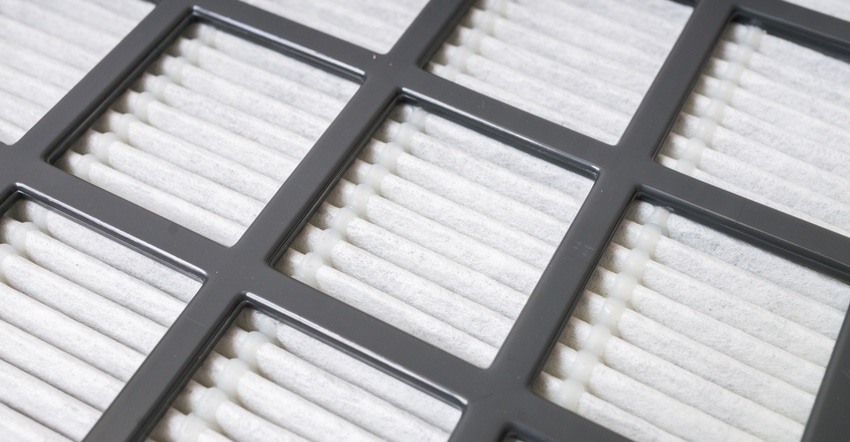
You’ve likely heard of high-efficiency particulate air filters as a useful tool to deal with poorly ventilated spaces, but have you considered using one on your farm?
Peter Wright, an agricultural engineer with Cornell University, says HEPA filters — whether portable systems or installed on an existing heating or air conditioning system — can be a useful tool, especially in poorly ventilated spaces like an office or break room.
“Ventilation and filtration provided by heating, ventilating and air-conditioning (HVAC) systems can reduce airborne concentration of the virus that causes COVID-19 (and the flu virus), which can reduce risk of transmission through air in enclosed work and break areas of a dairy farm,” he writes in a recent Cornell Pro-Dairy posting.
COVID-19 is challenging to deal with not only because of how dangerous it is, but the fact that many people, particularly young and healthy people, don’t show symptoms and can pass it on to someone else without even knowing it.
“People who are infected but do not show symptoms can also spread the virus,” he says. “When people with COVID-19 cough, sneeze, sing, talk or breathe, they produce respiratory droplets. These droplets can range in size from larger droplets (some of which are visible) to smaller droplets. Small droplets can also form particles when they dry very quickly in the airstream.
“Ventilation and filtration provided by heating, ventilating and air-conditioning [HVAC] systems can reduce airborne concentration of the virus that causes COVID-19 [and the flu virus], which can reduce risk of transmission through air in enclosed work and break areas of a dairy farm. A high ventilation rate can remove airborne particles and bring fresh outside air into a room. During cold weather, when heating the outside air is not feasible, air purifiers can help reduce airborne contaminants, including viruses, in a work room or confined space.”
The fibers in a HEPA filter can theoretically remove at least 99.97% of dust, pollen, mold, bacteria and any airborne particles with a size of 0.3 microns, according to the U.S. EPA. Minimum Efficiency Reporting Values (MERVs) are used to report a filter's ability to capture larger particles between 0.3 and 10 microns and can be useful in deciding what type of HEPA filter to buy.
“The net result is that virtually all particles get captured quickly, while airflow is only slightly impeded,” he says.
How one is used on a dairy farm, or any other farm for that matter, really depends on the system already in place. And that varies widely. If you have a heating system with a filter that can easily be changed, just switch it out for a HEPA and you’re done.
Some systems are more sophisticated and might have to have a HEPA filter installed, and that can be costly.
You can also buy a portable HEPA filter, which Wright says can cost anywhere from $230 to $350. The size of the space you’re trying to ventilate is something that needs to be carefully thought out.
For example, if you’re trying to purify the air in a breakroom, you need to position the filter in a way that “captures” the air from people where they congregate the most, like a break table. In this case, two portable filters — one on either side of the break table — are best because it will capture the air coming from all directions.
It’s important to weigh the cost of getting a portable HEPA filter to your own situation. Wright says that farmers with several employees shouldn’t just think that the air filter alone will take care of any potential issues. Other things such as requiring masks, consistent handwashing and careful scheduling of breaks to promote social distancing are still key.
“The best recommendation from Centers for Disease Control and Prevention continues to be that people maintain social distancing, wear a face covering, wash hands frequently and treat frequently touched surfaces with disinfectants,” Wright says. “COVID-19 is thought to spread mainly through close contact from person to person, including between people who are physically near each other, within about 6 feet.”
Read more about:
Covid 19About the Author(s)
You May Also Like






